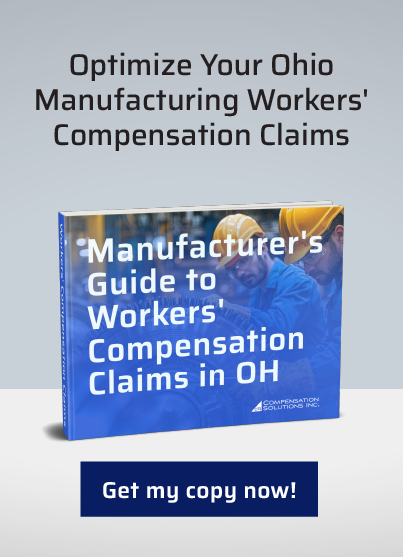Claims Management: How to Optimize OH Workers' Mfg. Compensation

Manufacturing sites average hundreds of thousands of injuries each year, and for employers in the industry, this often translates to in-depth claims management and extensive employee compensation.
Unfortunately, many employers in Ohio's manufacturing sector struggle with handling workers' comp. Offering fair compensation while staying compliant and managing bottom lines can be a challenge.
Fortunately, there are several ways to reduce the risk of workplace injuries and manage workers' compensation complexities. Read on to learn how while still complying with Ohio BWC regulations.
Understanding Workers’ Compensation and Claims Management in Ohio Manufacturing
Workplace injuries aren't just a risk; they're a sad reality in Ohio's manufacturing sector. Factories are full of hazards and potential accidents, which are more common than most employers would like to admit.
Repeated workplace injuries can have a significant impact on a company's profits and bottom line. After such incidents come the hassles and financial strain of workers' compensation.
The Ohio Bureau of Workers' Compensation (BWC) governs the compensation process for workers who sustain work-related illnesses or injuries. According to the BWC, employers must report injuries immediately and cooperate with it throughout the claims process. Failing to do so often leads to penalization and increased costs.
The most effective way to manage employees' compensation costs is to incorporate preventive measures into the workplace. The major proactive measures are investing in workplace safety and training.
Pay Attention to Workplace Safety
This is the primary way of preventing injuries in the workplace. These actions may seem minor but can go a long way toward keeping your employees safe.
First, always ensure that your employees have and wear their personal protective equipment (PPE). You should also conduct regular safety audits and hazard assessments to identify and eliminate any sources of accidents. Finally, check that your tools and machines are regularly inspected and serviced to avoid machine failures and tool-related injuries.
Thoroughly Train New and Old Employees
Teach your new employees the importance of following safety instructions and using their PPE. Many workplace accidents are due to ignoring safety precautions or operating machines incorrectly. Ensuring that your new employees are properly trained in these areas reduces the chances of accidents.
Periodic training for senior employees is just as crucial. It will refresh their memories, reemphasize the importance of workplace safety, and keep everyone abreast of new developments.
Educate your staff, both new and existing, on their rights and responsibilities. Teach them the protocol for reporting an injury and the importance of transparency and swift action.
Best Practices for Effective Claims Management
Applying these pointers can help you manage and optimize your workers' manufacturing compensation.
- Report Injuries Immediately: Train your employees and supervisors to report injuries as soon as they occur. You must also have clear procedures for reporting such cases. Doing so immediately can be the difference between a simple scar and a life-threatening injury. It can also reduce long-term claims costs.
- Thoroughly Investigate and Document Every Event: Ensure that you investigate and document every incident. Gather eyewitness reports, identify the root causes, and take the necessary steps to prevent future occurrences. This information will be useful when processing compensation claims.
- Regularly Communicate with Your Injured Employees: Communicate regularly with the affected employee throughout the claims process. Maintaining honest and regular communication helps them understand the process and makes for a smoother recovery.
- Organize Return-to-Work Programs: Implementing return-to-work programs can help you manage BWC claim costs. If the employee can't resume their previous tasks, consider offering light-duty assignments that fall within medical restrictions.
The Role of Third-Party Administrators (TPAs) in Claims Management
TPAs are organizations that handle workers' compensation claims on behalf of companies. In Ohio, they work with the BWC to ensure that your claims are handled compliantly, efficiently, and cost-effectively.
These organizations have specialized knowledge of BWC compliance and claims management. Their skill set enables them to effectively navigate the claims management process for a business.
Benefits of Partnering with a TPA
TPAs benefit companies in several ways, namely that they:
- Promote Regulatory Compliance: TPAs ensure that manufacturing companies meet BWC regulations. The system is strict with its rules and timeliness. Partnering with a TPA ensures that you're compliant by:
- Filing claims and supporting documents correctly
- Advising on changes to state laws and policies
- Supporting appeals and hearings when disputes arise
- Provide Expertise and Oversight: TPAs are experts in workers' compensation and BWC compliance. They oversee the entire process, ensuring that your documents are complete and that you meet all deadlines. They also help you spot red flags early.
- Save on Costs: TPAs can help clients reduce claim duration and expenses through early intervention and aggressive claims management. They do this by:
- Identifying and contesting inflated treatments
- Monitoring indemnity payments to avoid cases of overcompensation
- Identifying and pursuing subrogation opportunities
- Reduce the Administrative Burden: TPA reduces the administrative burden of claims management, which often involves a significant amount of paperwork. From filing reports to following up on treatments and establishing return-to-work policies, the administrative burden adds up. TPAs handle these aspects of employee management so you can focus on other aspects of running a manufacturing company.
- Manage the Medical Aspect: TPAs often work with medical professionals to ensure that employees receive standard medical treatment at the best rates. They coordinate medical appointments, review the necessity of the administered treatments, and recommend BWC-certified providers. They also ensure that employees recover properly so they can safely return to work.
Conclusion
Managing workers' compensation claims in Ohio can be a hassle, especially without the right expertise. A simple mistake in BWC compliance can result in extended costs, impacting your bottom line. This is why working with a TPA is essential. You can optimize your compensation claims process with ease by partnering with CSI. It handles every part of the process, from reporting the injury to facilitating return-to-work policies.
Managing workers' compensation claims in Ohio shouldn’t be a headache. Partner with CSI to take the hassle out of claims, lower costs, and stay compliant with Ohio BWC regulations. Focus on your business and employees, and let our seasoned experts guide you through the complexities of workers' comp. Contact us today to streamline the process and experience stress-free claims management!

